#profit over people
Text
networks and streamers cancelling shows they *can't* afford is insane. they can't afford the shows they create, they underpay their writers, and yet they rake in profit and return it to shareholders:
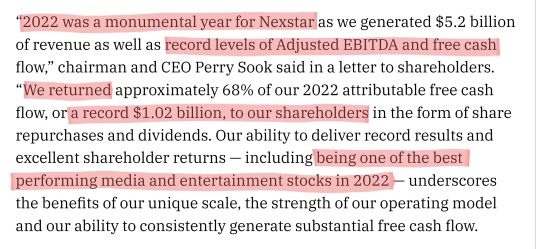
can someone please explain this shit? bc all i see is tptb cancelling beloved shows and crying poormouth then turning huge profits and caring more about money than the point of the business they're actually in:
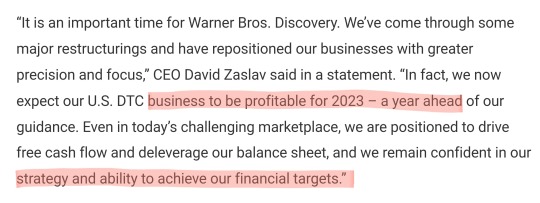
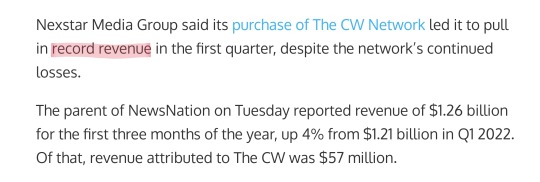
they turn a profit by gutting their assets.

#the cw#nexstar#tv shows#streaming platforms#greed#?#.txt#savethewinchesters#spnwin#gotham knights#superman and lois#also the hundreds of millions they earn in politicial ad revenue alone is insane. America is insane.#WGA strike#warner bros#profit over people
79 notes
·
View notes
Text
profits over people — the corporate hellscape of internet censorship, safety, privacy, data mining…
#capitalism#internet censorship#internet#data mining#profit over people#apple#microsoft#kosa#chrome#google#privacy#privacy protection#internet privacy#monopoly#european union#eu#corporate hellscape#kids online safety act#2024
11 notes
·
View notes
Text


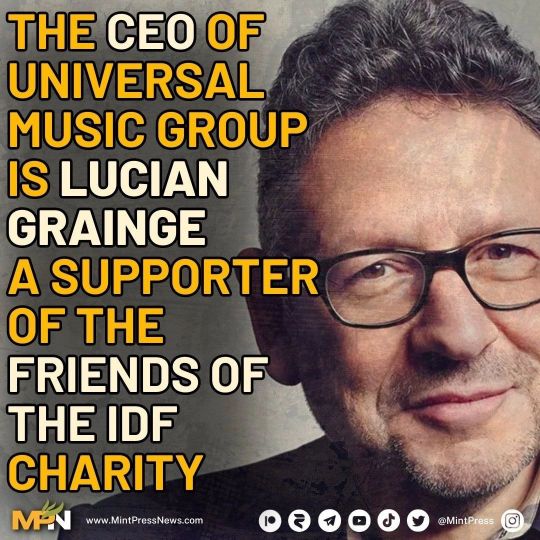



#dj khaled#dj coward#dj callous#stop embarrassing yourself#boycott dj khaled#no more excuses#ethics over money#apartheid#save palestine#ethnic cleansing#israel is an apartheid state#seek truth#free palestine 🇵🇸#genocide#illegal occupation#israel is committing genocide#israeli war crimes#not another one#universal music group#spread awareness#jordans#even if you think hes silent because of his label that doesnt give him free reign to demand being carried like a spoiled fat fool#fuck dj khaled#profit over people#profit over Palestine#shame on you#your music sucks anyway#cancel khaled#use your influence for good#out of touch
3 notes
·
View notes
Text
when it comes down to it what every single boss really wants is for you to do more work and produce more output for the same exact pay
and this is why absolutely none of them can be trusted, ceos down to your direct supervisors
it's so normalized in corporate workplaces when it's actually so sick
#workers are literally out here fighting for their fucking lives just to give a fair exchange of work for pay#capitalism#profit over people
18 notes
·
View notes
Text
Human life, if it can be assumed to have any value at all, is a long term high risk investment.
#cynical thought of the day#corporate American hellscape#profit over people#things I think while cleaning out the barn drains
1 note
·
View note
Text
Noam Chomsky, Profit Over People
One-sentence summary: Neoliberalism, or the free market economy, is really just a cover story for a system that allows the rich to plunder the poor.
This is it. This is THE book to read to understand how exactly the rich and elite have successfully conned the world into believing that free markets are the magical solution to all the world’s problems. That’s a lie. Free markets don’t work. Or, rather: they do, but not in the way you they want you to think.
Free markets don’t work as a tool for economic development. Free markets don’t raise standards of living.
Countries that are prosperous today - such as the United States, Britain, and Japan - have all relied on (and still rely on) significant government intervention, in the form of subsidies and protectionist policies, for economic growth.
In other words: Rich countries didn’t get rich by subscribing to neoliberalism. They got rich by breaking the rules of neoliberalism.
So why do these countries try to impose free markets on the rest of the world?
Because free markets work very, very well to protect Western business interests. Free markets allow the rich to plunder the poor, and keeps the current global economic order locked in place. On a level playing field, those who are already strong will always win, while the rest will always lose.
Under the current economic order, developing countries have one of two roles to play:
Provide cheap labor to Western businesses for corporate profit
Provide a market for highly protected Western businesses to sell their goods
The first beneficiaries of these countries’ resources are to be Western investors, not the actual people of those countries.
To make sure that developing countries play their designated service roles, the West (and the United States in particular) has a wide arsenal of tools at their disposal:
Free Trade Agreements
Imposed through institutions such as the WTO and NAFTA, free trade agreements are the softer, more “diplomatic” (but still coercive) approach to getting a country to open its borders to foreign investment.
Economic warfare
Sanctions and trade embargoes on countries that refuse to play their role. See: Cuba.
The CIA
Orchestration of military coups and other anti-democracy efforts to ensure that the “favorable” government (i.e. supports big businesses and foreign investment) takes / stays in power. See: almost any country in Latin America, Italy.
The Military-Industrial Complex
Domestically, this is how the United States government funnels billions of dollars into corporate subsidies (while avoiding the democratizing effects of social spending) so that they can continue to stay ahead of the rest of the world.
The Propaganda Machine
A Cold War relic. Why is anti-Communist fear still a thing today, when the USSR collapsed over 30 years ago? Because it’s a very useful way for the United States to justify all of the above.
With these tools, the neoliberal regime sets out to crush things that could actually help build wealth in the hands of the people, such as democracy, labor unions, populist movements, distributive policies, and social welfare. And unfortunately they’ve been pretty successful.
#noam chomsky#profit over people#anti capitalism#post capitalism#fuck neoliberals#free market economy#neoliberalism#book summaries
6 notes
·
View notes
Text
Más párrafos de ese capítulo 4 de "Profit Over People", de Noam Chomsky
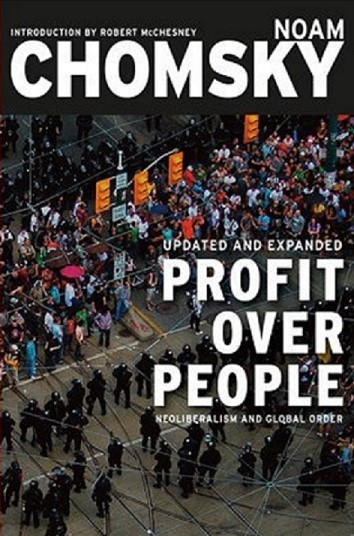
The last clause requires a gloss. The term, United States is conventionally used to refer to structures of power within the United States; the “national interest” is the interest of these groups, which correlates only weakly with interests of the general population. So the conclusion is that Washington sought top-down forms of democracy that did not upset traditional structures of power with which the structures of power in the United States have long been allied. Not a very surprising fact, or much of a historical novelty.
Within the United States itself, “top-down democracy” is firmly rooted in the Constitutional system. One may argue, as some historians do, that these principles lost their force as the national territory was conquered and settled. Whatever one’s assessment of those years, by the late nineteenth century the founding doctrines took on a new and much more oppressive form. When James Madison spoke of “rights of persons,” he meant persons. But the growth of the industrial economy, and the rise of corporate forms of economic enterprise, led to a completely new meaning of the term. In a current official document, “Person’ is broadly defined to include any individual, branch, partnership, associated group, association, estate, trust, corporation or other organization (whether or not organized under the laws of any State), or any government entity,”a concept that would have shocked Madison and others with intellectual roots in the Enlightenment and classical liberalism.
These radical changes in the conception of human rights and democracy were introduced primarily not by legislation but by judicial decisions and intellectual commentary. Corporations, which previously had been considered artificial entities with no rights, were accorded all the rights of persons, and far more, since they are “immoral persons,” and “persons” of extraordinary wealth and power. Furthermore, they were no longer bound to the specific purposes designated by State charter but could act as they chose, with few constraints.
La última cláusula requiere una observación. El término Estados Unidos es usado convencionalmente para referirse a las estructuras de poder dentro de los Estados Unidos; el “interés nacional” es el interés de esos grupos, que se correlaciona muy débilmente con los intereses de la población en general. Por lo tanto, la conclusión es que Washington ha buscado formas de democracia descendentes que no modifiquen las estructuras de poder tradicionales con las cuales han estado aliadas durante mucho tiempo las estructuras de poder en los Estados Unidos. Un hecho no muy sorprendente; tampoco una novedad histórica.
Dentro de los mismos Estados Unidos, las raíces de la “democracia de arriba hacia abajo” están firmemente ancladas al sistema constitucional. Alguien podría argumentar, como lo hacen algunos historiadores, que estos principios perdieron su fuerza conforme el territorio nacional fue conquistado y poblado. Independientemente de cuál sea la evaluación personal de esos años, para finales del siglo XIX las doctrinas fundadoras tomaron una forma nueva, mucho más opresora. Cuando James Madison se refirió a los “derechos de las personas”, quiso decir personas. Pero el crecimiento de la economía industrial, y la elevación de las formas corporativas del emprendimiento industrial condujo a un nuevo significado del término. En un documento oficial actual, la palabra “persona” es definida en amplitud para incluir a cualquier individuo, rama, sociedad colectiva, grupo asociado, asociación, agencia inmobiliaria, fideicomiso, u otra organización (independientemente de que haya sido organizada o no bajo las leyes de algún Estado), o cualquier entidad gubernamental,” un concepto que habría conmocionado a Madison y a otros con raíces intelectuales en la Ilustración y en el liberalismo clásico.
Estos cambios radicales en la concepción de derechos humanos y democracia fueron introducidos primariamente no mediante legislación, sino mediante decisiones judiciales y comentario intelectual. A corporaciones, que previamente habían sido consideradas entidades artificiales sin derechos, les fueron concedidos derechos de personas, e incluso más, puesto que eran “personas no morales”, y “personas” de extraordinaria riqueza y poder. Todavía más, ya no estarían vinculadas a propósitos específicos designados por estatutos del Estado, sino que podían proceder como quisieran, con pocas restricciones.
1 note
·
View note
Text
youtube
0 notes
Text
The Hypocrisy Of Wealth
I’ve made no secret of the fact that I am not a fan of great wealth or those who possess it. Some may have earned their wealth honestly, others (the majority) were born into it or obtained it in ways that were less than honest. Either way … I don’t understand how anyone can justify having a million dollars or more when that money could provide food for the hungry, build homes for the homeless. …
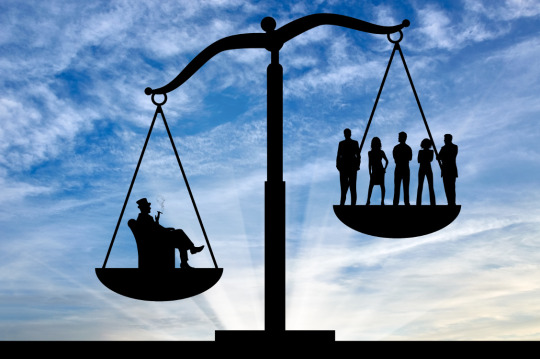
View On WordPress
0 notes
Text
Ashley's Rant of Train Derailments
Ashley is pretty fed up with all the train derailments. You know why they are happening? Profit over people! We need to stop putting up with this and actually take a stand.
#revolt#revolution#train#trains#train derail#train derailment#train derailments#governemnt#profit over people#profit#big companies#podcastandchill#maine#podcast
0 notes
Text
Something I miss from earlier eras of the creative side of the internet was things just being unabashedly low-budget. Just all unashamedly amateur, unprofessional, ‘I don’t own a good camera but I have a story to tell you’, ‘I can’t afford a good mic but I have a song to sing for you,’ ‘I don’t have any kind of background in editing or lighting and I only just picked up this guitar last Tuesday but here’s an entire musical me and my friends wrote about our favourite book, we filmed it on a potato and put it up on YouTube in ten minute segments because we thought it was pretty funny.’
#everything felt so much less like Content then#and as someone who wants to share creative stuff online#it’s now incredibly daunting thinking about doing that bc#especially as a disabled person who can’t work full time#it feels almost impossible to extricate art from being Content#like there’s this immense pressure to produce things that could pass as professionally produced by a team of educated people#and to make smart decisions so that somehow eventually you can profit off your art#and instead of it being a ‘hey look at my silly little song’ it becomes#competing in an over saturated market already dominated by the nepotism afforded by wealth and connections#and it feels like it would very difficult not to measure my personal satisfaction with how a certain piece of art turned out#by how much attention it got online#even though I genuinely have zero desire to be famous and it sounds like a complete nightmare#anyway I’m gonna have ice cream for dinner how about you guys#hmp42
5K notes
·
View notes
Photo
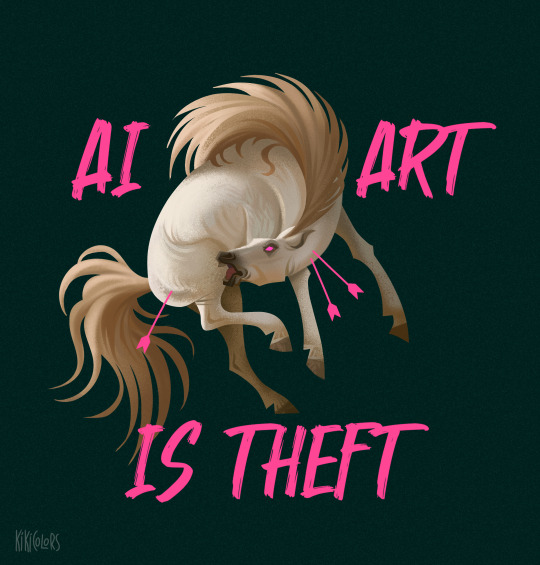
:/
#it makes me furious#especially when they use the my art tag along with ai art#its not ur art its thousands maybe millions of other artists' hard work ur profiting off of and somehow not feeling shame over?#imagine genuinely being proud of that#its completely unregulated and theres no rules#people are using ai art for their childrens books/illustrated novels and selling them on amazon#its so disgusting#i understand doing it for fun but you didnt 'make it' and you shouldn't profit off of it#artists on tumblr#Artists of Tumblr#Illustration#Digital Illustration#digital drawing#animal art#horse#ai art#anti ai art#arrow#arrows#animal portrait#equine#artists#art#digital painting#no to ai art
3K notes
·
View notes
Text
Paying into a system that normalizes #schoolshootings, #policeshootings and shooting shootings as if it is just a natural state of life is confounding and depressing. It isn't a new phenomenon in a country born just as much on hate as it was on high minded ideals. Not even targeted well cultured hate...just hate conditioned through operating from a scarcity model while actively wasting resources at a quicker pace than cultivating growth. A form of hate that is more dangerous in how it's easily conditioned in the isolation that grows in people's spirits. Isolation built despite the world being so connected. Propagated in an anti-human culture that happily feeds on its young and manufactured minorities that .
So the outcries to vote for change, write and or plea with elected officials...it isn't enough when this IS the culture! Death, poverty, mental instability, imprisonment/enslavement, nutritional despair, panic, outrage, and such has been made profitable and passable as an everyday thing.
Usually I try to operate with a solution in mind, but there is too much evidence of money and this sick theater/ snuff film called politics taking greater precedent over people. Politics is just ORIENTATION. We all have experienced some form of orientation...what is the purpose? To get you accustomed to an environment, process, culture or way doing things...right? You'd assume politicians and the people by in large have brains, hearts, emotions, family's and a relative sense of wanting the best for them...but maybe JUST them and no one else...?
So what are we doing?
Why is equality (hold up wait...that is too broad a concept) .
Why is equity (nope no that is too esoteric and conditional).
Why Is Common Damn Sense so hard to act upon when it comes to eliminating the worse aspects of our collective humanity?!?
That's where the solutions get fuzzy, because we also live in a country and world that gleefully denies people's humanity as class distinction is how they derive their comforts (built via the mythology of race or religion or gender or hue etc.). Then you try to deal with that darkness in the hearts of what feels like the majority who, whether willfully or not, are ignorant of their own cognitive dissonance to the degree that the shared dissonance becomes harmony.
We are adaptive beings capable of creating and surviving damn near anything. Yet, this is what is CHOSEN. Over and Over and Over...
Peace to all taken from this world violently, senselessly and without cause as well as the hearts left to deal with it.
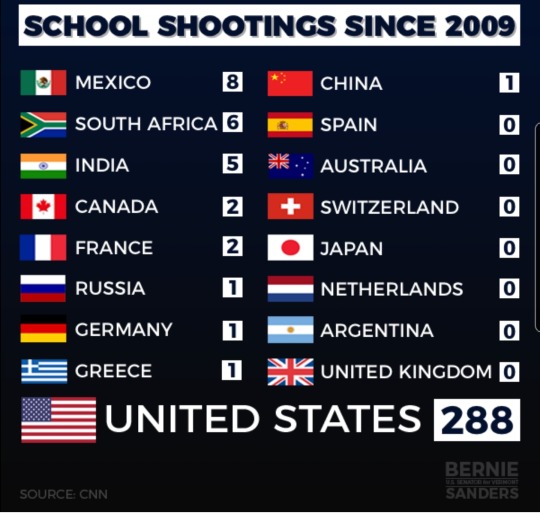
#robbelementaryschoolshooting#buffaloMarketShooting#school shootings#police shootings#Cultural Issues#Profit over People#Politics AS Orientation For dysfunction#onaje'sthoughts
0 notes
Text
*this isn't about them
#star trek deep space nine#star trek ds9#Ferengi#rb for sample size#I'm so curious the propaganda's gonna be good#who strikes the best balance of maximizing profit and not screwing you over while still being cool enough to do business with#i have suspicions but we'll see what the people say
318 notes
·
View notes
Text

image ID: the destiel breaking news meme, but after cas says "i love you", dean replies:
cas, danaher corporation and it’s subsidiary company cepheid are still charging tuberculosis (TB) patients in low- and middle-income countries $10–$20 to access quick and accurate testing despite the fact that cepheid’s genexpert machine tests were developed with at least $252 million in taxpayer money and doctors without borders found out that the tests only cost $3–$4.50 to produce. TB is a major cause of death and disability, not to mention that the inaccessibility of these tests leads to the spread of drug resistant TB around the globe.
it’s #timefor5. find out how you can help at tbfighters.org
#supernatural#destiel#people over profits#time for 5#danaher#cepheid#tuberculosis#tb#public health#john green#vlogbrothers#danaher corporation#healthcare#social justice#medicine#epidemic#castiel#dean winchester#hank green#doctors without borders#médicines sans frontièrs#msf#stop tb#stoptb#partners in health#peopleoverprofits#timefor5#image id#saw a similar one w the destiel template on twxttxr and i had to join in
414 notes
·
View notes